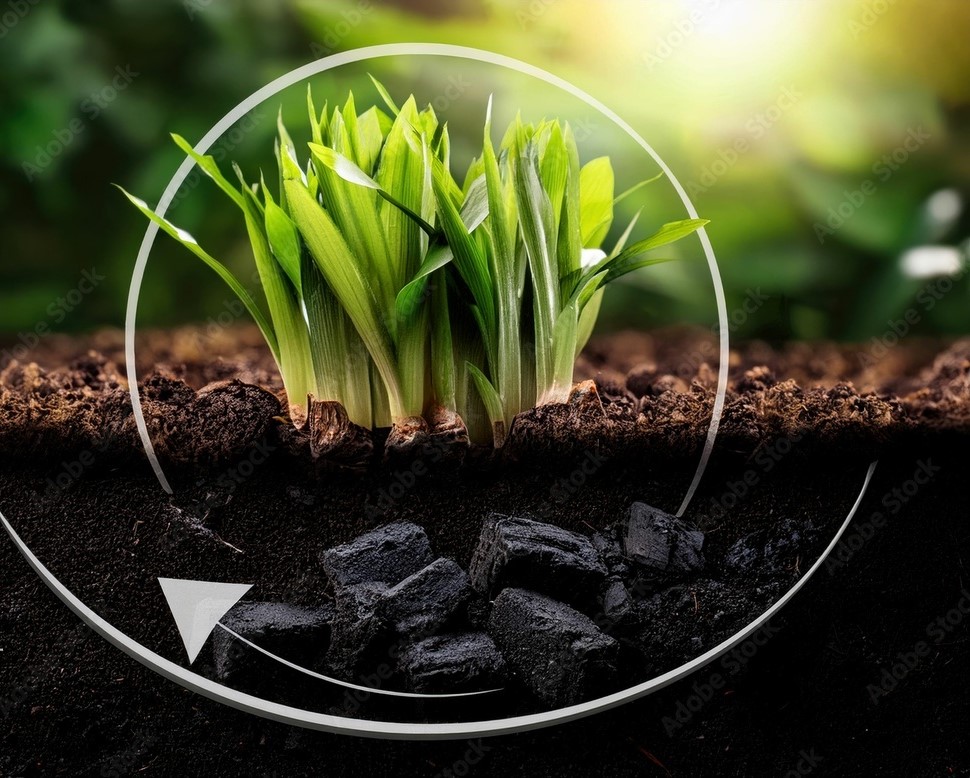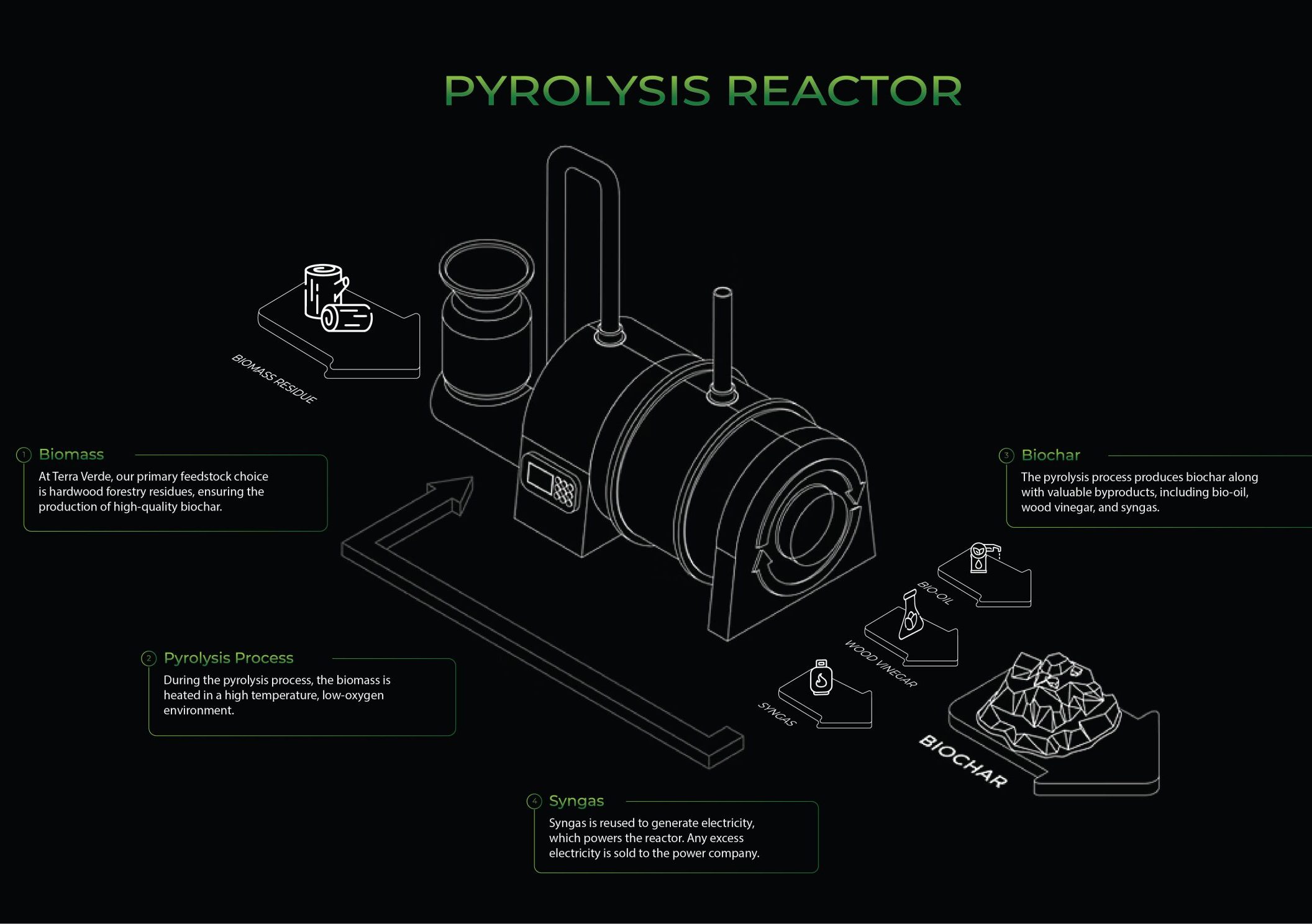GROWING A BETTER TOMORROW WITH BIOCHAR

Terra Verde
At Terra Verde, we are committed to advancing sustainability for a healthier planet and a more resilient future. Through the production of Verdichar™, our premium biochar, we transform agricultural and forestry residues into a powerful solution that mitigates climate change, enriches soil health, and reduces waste. Guided by the principles of the circular economy, we repurpose organic byproducts into valuable resources, closing waste loops and maximizing environmental and economic benefits.
Our work is guided by the belief that environmental stewardship and social responsibility go hand in hand. Through innovative and efficient practices, we repurpose natural waste into products that benefit farmers, ecosystems, and communities. In addition to driving environmental progress, we are proud to create jobs and support economic development in the regions where we operate, fostering stronger and more sustainable local economies.
By improving agricultural productivity, sequestering carbon, and empowering communities, our mission is to create lasting, measurable change for both people and the planet. Together, we’re not just addressing today’s challenges—we’re growing a better tomorrow, with biochar.

How Biochar is Made?
At Terra Verde, we transform agricultural residues and eucalyptus waste, including roots, bark, branches, and other wood byproducts, into biochar. Through pyrolysis, these organic materials are subjected to high heat without oxygen, resulting in the production of biochar along with renewable energy in the form of gases and heat. We harness this energy to power our operations and support local communities with clean electricity or heat, making the entire process both efficient and sustainable.

Why is Biochar Important?
Biochar addresses some of today’s most pressing challenges. It stabilizes carbon from the atmosphere, providing a reliable way to combat climate change. When added to soil, biochar enhances water retention, nutrient availability, and overall fertility, fostering healthier and more productive agricultural systems. The renewable energy generated during its production also helps reduce dependence on fossil fuels, while the use of organic residues minimizes waste and creates valuable byproducts.
“Biochar is a powerful tool that combines waste management, carbon sequestration, and soil improvement into a single solution.”
— World Resources Institute (WRI)
Climate Solutions
Unlocking the Power of Biochar
Biochar represents a revolutionary approach in the global effort to combat climate change. By offering an innovative and effective method of carbon sequestration and greenhouse gas reduction, biochar delivers far-reaching benefits for both the environment and sustainable development. Here’s why biochar is a cornerstone of climate solutions.
By 2035, Terra Verde aims to achieve ambitious milestones that establish us as a global leader in sustainability

High-Permanence Carbon Removal
Biochar is produced through pyrolysis, a process that thermally decomposes organic material in a low-oxygen environment

Addressing Unavoidable Emissions
Some sectors, such as agriculture and transportation, face inherent challenges in fully eliminating greenhouse gas emissions.

Reducing Fertilizer-Related Emissions
Biochar plays a vital role in sustainable agriculture by reducing dependence on synthetic fertilizers,

Renewable Energy
Production
The production of biochar through pyrolysis generates renewable energy byproducts, such as heat and syngas.
How Biochar is Made?
At Terra Verde, we transform agricultural residues and eucalyptus waste, including trunks, bark, branches, and other wood byproducts, into biochar.
Why is Biochar Important?
Biochar addresses some of today’s most pressing challenges. It stabilizes carbon from the atmosphere, providing a reliable way to combat climate change.
Revitalizing Soil Health
Eucalyptus plantations are harnessing the benefits of biochar for depleted land, enhancing nutrient retention, water retention, and soil structure
VerdiChar
The Power of VerdiChar
- Enhances soil health by improving structure and fertility.
- Helps capture and store carbon, reducing greenhouse gases.
- Increases soil’s ability to retain moisture, benefiting crops.
- Made from renewable eucalyptus residue, reducing waste.
- Blended with select microorganisms to enhance soil biology.
- Why Choose Verdichar?
- Applications
- Environmental Benefits
- Superior Soil and Water Performance
- How Verdichar Works
Blockchain
Bringing Transparency to Sustainability
- Ensures transparent and traceable carbon credit transactions.
- Provides decentralized accessibility for broader participation.
- Ensures permanent records, enhancing trust in carbon credits.
- Enables seamless global carbon credit trading.
- Transparent and Trustworthy Carbon Accounting
- Transparent and Trustworthy Carbon Accounting Tokenized Carbon Credits for a Dynamic Marketplace
- Transparent and Trustworthy Carbon Accounting Tokenized Carbon Credits for a Dynamic Marketplace Ensuring Integrity and Fraud Prevention
- Transparent and Trustworthy Carbon Accounting Tokenized Carbon Credits for a Dynamic Marketplace Ensuring Integrity and Fraud Prevention
FAQ
Answers to Your Questions
Still Have Questions?
Biochar is produced through a process called pyrolysis, where organic materials such as wood or agricultural waste are heated at high temperatures in the absence of oxygen. The quality of biochar depends on factors like feedstock type, temperature, and the pyrolysis process. Terra Verde uses high-quality feedstocks and precise manufacturing methods to ensure top-tier biochar.
Yes, biochar is particularly effective in degraded lands. It can enhance soil structure by improving aeration and water retention, while also increasing nutrient-holding capacity. This makes it a valuable tool in soil restoration and reclamation efforts.
Biochar enhances soil health by improving water retention, nutrient efficiency, and promoting beneficial microbial activity, leading to increased crop yields and resilience to environmental stress.
Biochar sequesters carbon in the soil for hundreds to thousands of years, mitigating greenhouse gas emissions and promoting long-term soil fertility without depleting natural resources.
Biochar can benefit a wide range of crops, including but not limited to, fruits, vegetables, grains, and specialty crops by improving soil structure and nutrient availability, resulting in healthier plants and higher yields.
Yes, there are numerous scientific studies supporting the benefits of biochar for various agricultural, environmental, and climate-related applications. Research has shown that biochar can improve soil fertility by increasing nutrient retention, enhancing water retention, and promoting beneficial microbial activity. Studies also demonstrate its role in sequestering carbon, which helps mitigate climate change by reducing CO2 concentrations in the atmosphere.
Additionally, biochar has been found to improve soil structure, increase crop yields, and reduce the need for chemical fertilizers, making it a valuable tool for sustainable farming practices. Ongoing research continues to explore its potential in areas such as soil remediation, waste management, and even water treatment.
“Utilizing biochar in degraded soils worldwide could rehabilitate over 2 billion hectares of land, ensuring sustainable food production for future generations.”
— World Bank Group
“Incorporating biochar into our fields has decreased our fertilizer costs significantly, as it holds nutrients in the soil longer, reducing runoff and waste.”
– Sustainable Farmer